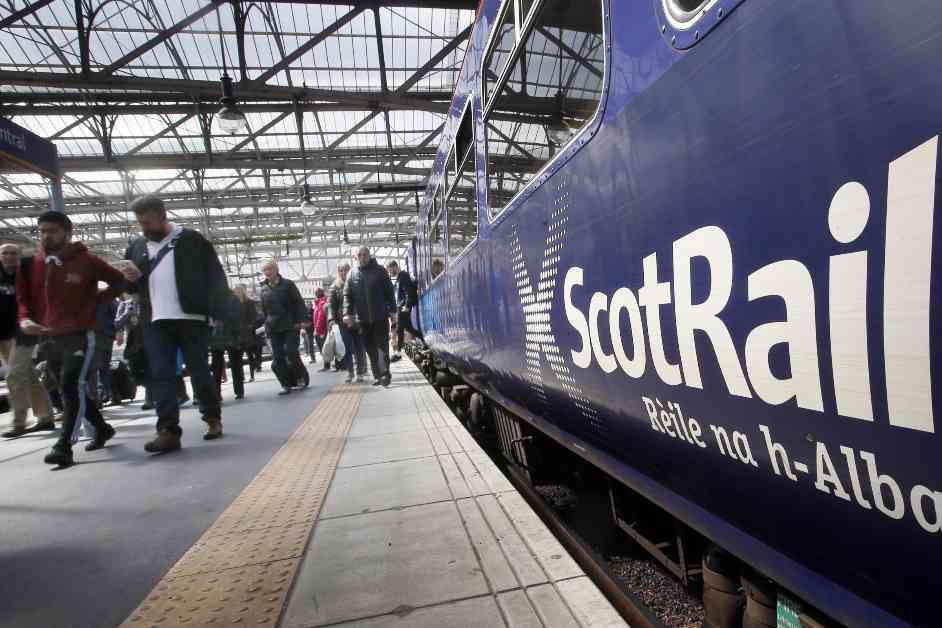The Scottish Tories are calling on the Government to reconsider their decision to reintroduce peak rail fares in Scotland. The pilot programme, which aimed to boost passenger numbers by removing higher fares during peak times, will come to an end on September 27. The decision to cancel the pilot comes amid financial challenges for the Scottish Government, who spent £40 million on the programme in the past year. As peak rail fares between Glasgow and Edinburgh are set to almost double, the Scottish Tories are urging a rethink on the decision.
Scottish Tories Demand Reversal of Peak Rail Fares Plan
Scottish Tory transport spokesman Graham Simpson expressed his concerns about the reintroduction of peak fares, calling it a “brutal and unjustified hike in ticket prices.” According to Simpson, this decision will be a blow to long-suffering train users who are already facing challenges with the current limited service provided by ScotRail. The increase in ticket prices during rush hour will only discourage commuters from using public transport, which goes against the Scottish Government’s goal of reducing carbon emissions and promoting sustainable transportation.
Simpson criticized the SNP Government for failing to deliver on their promises of improving ScotRail through nationalization. Instead, he argued that the service has deteriorated under their watch, making it even more unacceptable to impose higher fares on passengers. He called on MSPs from all parties to support the Scottish Conservatives in opposing the peak fares plan and urged ministers to reconsider their decision to betray train users.
Transport Scotland Responds to Peak Fares Controversy
A spokesperson from Transport Scotland defended the decision to end the peak fares removal pilot, citing the financial implications of subsidizing the programme. While the pilot was successful in saving passengers money during the cost-of-living crisis, it primarily benefited existing rail users and those with medium to higher incomes. The spokesperson explained that the subsidy required to sustain the programme in the current financial climate was not feasible, especially since the increase in passenger numbers was not significant enough to offset the costs.
Despite the disappointment for many rail users who will now face higher fares during peak hours, Transport Scotland introduced a 12-month discount on all ScotRail season tickets to provide some relief. The discount is available for weekly, monthly, and annual passes, aiming to support commuters who rely on public transport for their daily travel. The spokesperson acknowledged the challenges faced by rail travelers during this period and expressed hope that services would soon return to normalcy.
Impact of Peak Rail Fares on Commuters and the Environment
The reintroduction of peak rail fares in Scotland raises concerns about the impact on commuters and the environment. Higher ticket prices during peak hours could discourage people from using public transport, leading to an increase in car traffic and carbon emissions. This goes against the Scottish Government’s efforts to promote sustainable transportation and reduce the country’s carbon footprint.
Commuters who rely on trains to travel to and from work may face financial strain due to the doubling of ticket prices during peak times. For many individuals, the cost of transportation is a significant portion of their monthly expenses, and an increase in fares could have a detrimental effect on their budget. The decision to cancel the peak fares removal pilot could force some commuters to reconsider their mode of transportation, potentially leading to more cars on the road and worsening traffic congestion.
Looking Ahead: Finding a Balance between Affordability and Sustainability
As Scotland navigates the challenges of balancing affordability with sustainability in its transportation system, it is essential for the Government to consider the needs of commuters and the environment. While it is crucial to ensure the financial viability of public transport services, it is equally important to make them accessible and affordable for all residents. The decision to reintroduce peak rail fares should be reevaluated in light of its potential impact on passenger behavior and the overall goal of promoting sustainable transportation options.
Moving forward, policymakers must find a balance between generating revenue for the transportation network and providing equitable access to public transport. By considering the needs of commuters, especially those who rely on trains for their daily commute, the Government can make informed decisions that support both the financial sustainability of the rail system and the well-being of passengers. Collaboration between stakeholders, including government officials, transport agencies, and passenger advocacy groups, will be essential in finding solutions that address the challenges facing Scotland’s transportation infrastructure.
In conclusion, the Scottish Tories’ call to cancel the peak rail fares plan in Scotland highlights the ongoing debate over the affordability and sustainability of public transport services. While the decision to end the peak fares removal pilot may have financial implications, it is crucial for policymakers to consider the impact on commuters and the environment. By finding a balance between affordability and sustainability, the Scottish Government can ensure that public transport remains accessible and efficient for all residents.
































